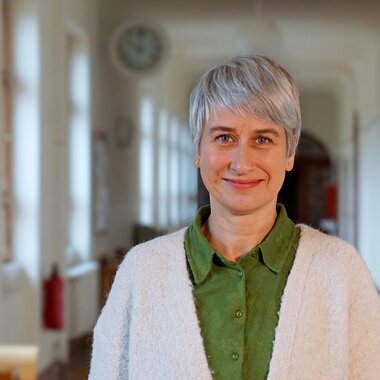Machunsky, Dr. Maya
Akad. Mitarbeiterin
Institut für Psychologie / Servicestelle Forschungsmethoden
Postanschrift:
Keplerstraße 87
D-69120 Heidelberg

- Geschäftsführerin der Servicestelle Forschungsmethoden
- Akademische Mitarbeiterin am Institut für Psychologie
- Methodische Beratung
- Lehre in den Bereichen Forschungsmethoden und Statistik sowie Psychologie
seit 2020: Akademische Mitarbeiterin am Institut für Psychologie, PH Heidelberg
seit 2018: Geschäftsführerin der Servicestelle Forschungsmethoden, PH Heidelberg
2016-2018: Leiterin der Abteilung Modelle und Methoden, management consult, Mannheim
2009-2016: Wiss. Mitarbeiterin am Lehrstuhl für psychologische Methodenlehre und Diagnostik, Universität Mannheim
2007-2008: Post doc, Université catholique de Louvain, Louvain-la-Neuve, Belgien
2007-2009: Wiss. Mitarbeiterin am Lehrstuhl für psychologische Methodenlehre, Universität Marburg
2002-2007: Wiss. Mitarbeiterin der DFG-Forschergruppe „Discrimination and Tolerance in Intergroup Relations“, Universität Jena
2002-2005: Promotion an der Universität Jena
1995-2001: Studium der Psychologie mit Nebenfach Soziologie an der Universität Gießen
Machunsky, M., Harth, N. S., & Gläßer, D. (2024). Middle to upper social class as a boundary condition for the beneficial effects of individual and group-level social identification on academic success. Paper presented at the coupled Symposium “Diversity and social identification in educational institutions” at the 53rd DGPs Congress/15th ÖGP Conference, Wien, Austria, 19.-19. September 2024.
Machunsky, M. (2023). Deconfounding social class and migrant background as sources of biased assessments of student achievement and future academic success. Poster presented at the 18th Conference of the Social Psychology Section (FGSP) of the German Psychological Society (DGPs)., 09.-11. September 2023.
Glaesser, D., Holl, C., Malinka, J. McCullagh, L., Meissner, L., Harth, N. S., Machunsky, M., & Mitte, K. (2023). Examining the association between social context and disengagement: Individual and classroom factors in two samples of at-risk students. Social Psycholy of Education.
Yavuz Temel, G., Rietz, C., Machunsky, M., & Bedersdorfer, R. (2022). Examining and Improving the Gender and Language DIF in the VERA 8 Tests. Psych, 4(3), 357-374.
Yavuz Temel, G., Machunsky, M., Rietz, C., & Okropiridze, (2022) D. Investigating Subscores of VERA 3 German Test based on IRT/MIRT Models. Frontiers in Education, 7:801372.
Machunsky, M. & Walther, E. (2015) Of Caucasians, Asians, and giraffes: The influence of categorization and target valence on social projection. Personality and Social Psychology Bulletin, 41, 1236-1246.
Machunsky, M., & Meiser, T. (2014). Us and them: Mood effects on ingroup projection. European Journal of Social Psychology, 44, 7-14.
Machunsky, M., Toma, C., Corneille, O., & Yzerbyt, V. (2014). Social projection increases for positive targets: Ascertaining the effect and exploring its antecedents. Personality and Social Psychology Bulletin, 40, 1373-1378.
Krueger, J. I., & Machunsky, M. (2010). Social projection. In I. Weiner & E. Craighead (Eds.), The Corsini encyclopedia of psychology (4th ed., p. 1639-1640). Hoboken, NJ: Wiley & Sons.
Bianchi, M., Machunsky, M., Steffens, M. C., & Mummendey, A. (2009). Like me or like us: Is ingroup projection just social projection? Experimental Psychology, 56, 198-205.
Machunsky, M., & Meiser, T. (2009). Ingroup projection as a means to define the superordinate category efficiently: Response time evidence. Social Cognition, 27, 57-75.
Meiser, T., & Machunsky, M. (2008). The personal structure of personal need for structure: A mixture-distribution Rasch analysis. European Journal of Psychological Assessment, 24, 27-34.
Machunsky, M., & Meiser, T. (2006). Personal Need for Structure als differentialpsychologisches Konstrukt in der Sozialpsychologie: Psychometrische Analyse und Validierung einer deutschsprachigen PNS-Skala. Zeitschrift für Sozialpsychologie, 37, 87-97.
Zurück zum Personenverzeichnis